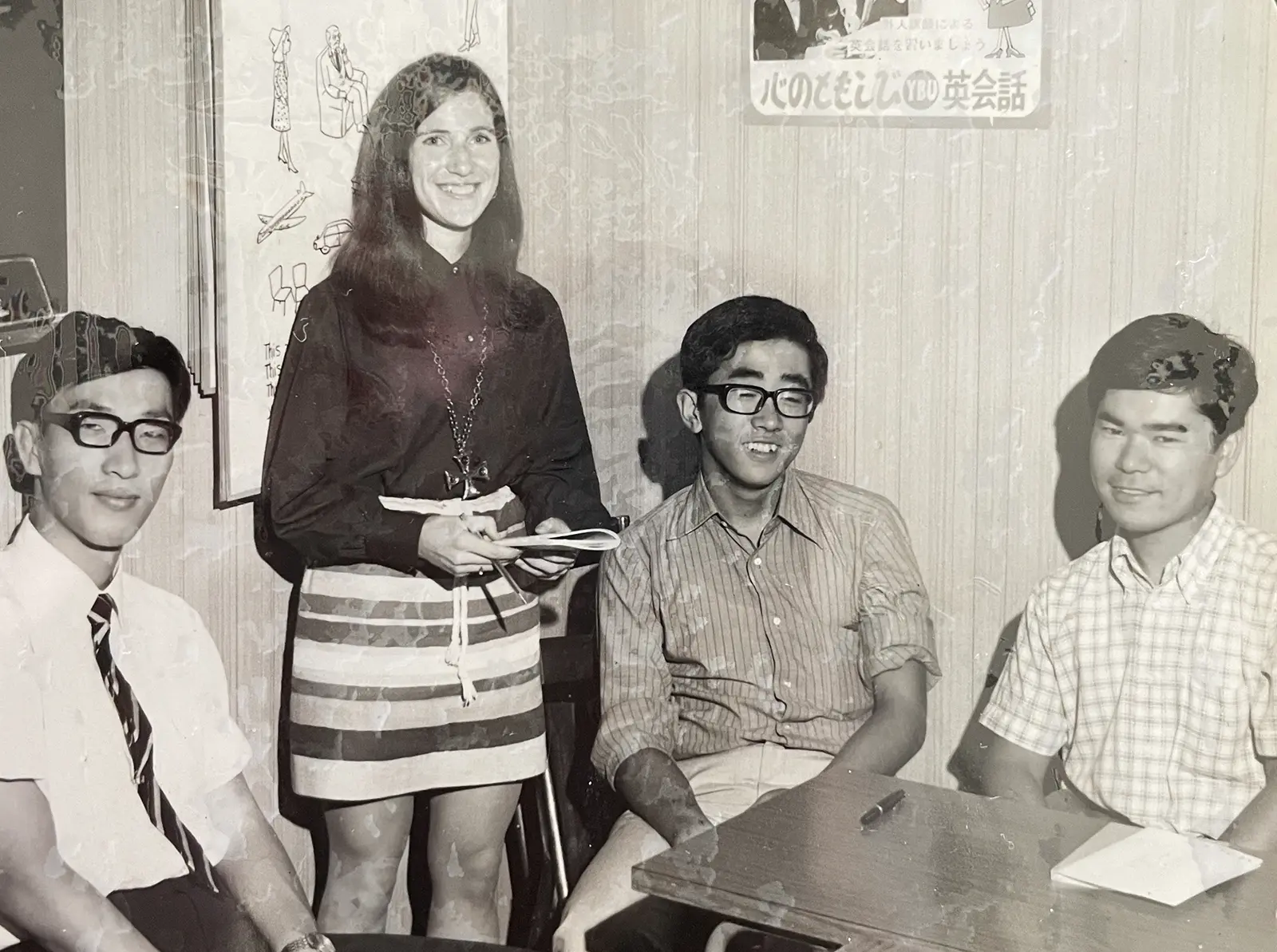
Mary Heidkamp teaching English with the Good Shepherd Movement in Kyoto in 1971
It was March 1971, and I was all set to graduate from Clarke University in Dubuque, Iowa, when Sister Dorita Clifford, BVM, asked me to host a Maryknoll missioner, Father Graham McDonnell, who was on campus to interview students interested in going to Japan to teach English. I had no interest in going to Japan or teaching English but was delighted to host the missioner.
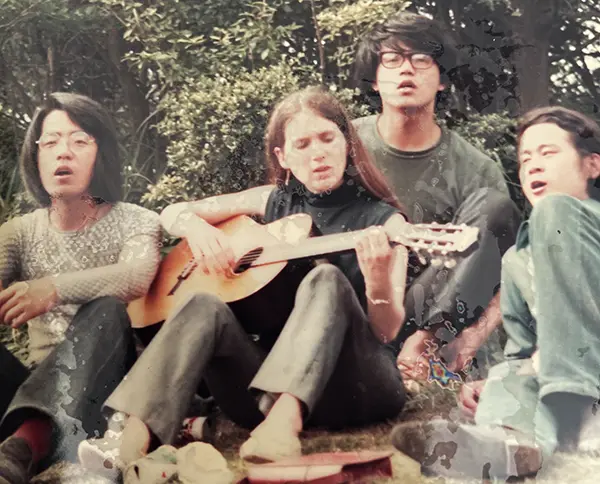
Singing at a picnic with students
Between his interviews, “Father Mac” and I talked about being a missioner, about my upbringing in Chicago and my teenage years in apartheid South Africa, where my father had moved our large family (11 siblings) for work. There we had frequently received missioners who worked in the villages and townships, some actively engaged in the struggle to fight apartheid.
At the end of a delightful yet exhausting day, I asked Fr. Mac who he wanted to meet for a second interview. He quickly looked me in the eye, smiled and said he had made up his mind that morning. I gulped, smiled back and let him know I wasn’t really interested in living in Japan or teaching English.
But Fr. Mac persisted, and soon I found myself part of a group of eight who began our work in Kyoto in August 1971, arriving on missionary visas. We were assigned to the English Centers of Yoki Bokusha no Unda, the “Good Shepherd Movement,” a catechetical program started by Maryknoll Father James Hyatt in the 1950s.
We did the best we could to prepare for our time in Japan. We all agreed we needed to learn Japanese – but how? With very few “learn to speak” programs available, we hired tutors. Maryknoll placed us in local Japanese neighborhoods, and we lived very simply. I was blessed with being placed to live with a family.
We were provided a brief orientation to Japan — about three or four days of learning a bit of the history, the culture and local customs — and were encouraged to join in local events and festivals.
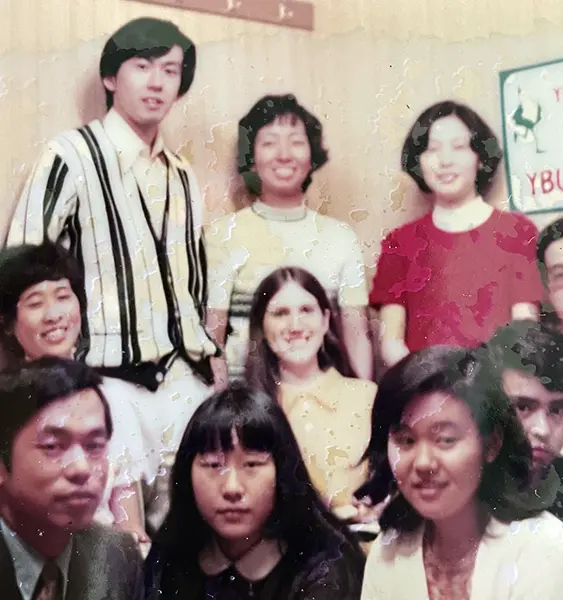
One of Mary’s English classes in Kyoto
Within a few days — us not knowing Japanese, our students not knowing English and a very limited program provided by the Maryknoll Fathers — we started teaching English.
I look back fondly on this complete immersion with little formal support. It was stressful and full of awkward moments. We learned to go to the public bath house and about local food, discovering that soy beans were in everything. I remember excitedly biting into what I presumed to be an all-American fudgsicle, but nope, it was frozen soy beans. My host family got a good laugh about that one!
Soon I adapted and learned to love the food, even taking cooking classes. We learned so much from our students, being invited to their homes and constantly learning about Japan from them, conversing with limited language skills and maximum pantomime.
One of my teammates was a linguist. She had no trouble learning Japanese — but she often wouldn’t speak it because she was a perfectionist and worried about making mistakes. I found that people responded well to my good-natured attempts at trying the food and speaking the language. As an extrovert, I was constantly trying to communicate.
Even though my grammar was poor and vocabulary limited, my teammates at times designated me to do the speaking when we went out as a group. Fortunately, our linguist would understand the answer — even when I couldn’t! Even without a formal program, we bonded as a team and made our way.
Of course, there were also often embarrassing moments. One Sunday during my third year, and by then I had been transferred to Tokyo, I invited some of my young women students to my tiny one-room apartment. I had recorded music from the radio to my cassette, so I would have background music.
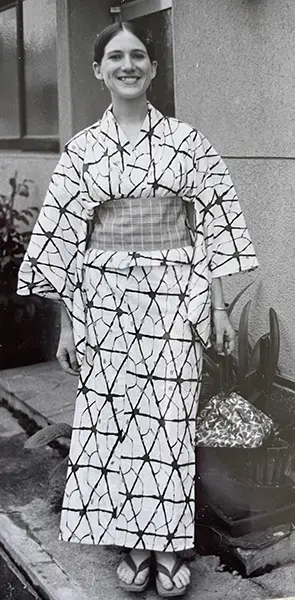
Heading to a local festival in a kimono.
Suddenly they were giggling. When I asked what was so funny, they sped through their dictionaries, looking for the right word. Finally one of them blushed and sheepishly explained that I had recorded a laxative commercial! We all had a good laugh!
All of us survived our initial mission experience. In fact, I went on to India, where I spent six months with the Indian teams of the International Grail Women’s Movement. Returning to the U.S. after more than four years abroad was a huge culture shock, and there was no help with “re-entry.”
Fast-forward to 1977, a couple of years after my overseas mission work had concluded, I was hired as the social ministry coordinator for the Diocese of Providence, Rhode Island. One of the first people I met was Maryknoll Sister Maura Clarke, who was part of the Maryknoll Sisters’ World Awareness Team.
She invited me to join her for a weekend at Maryknoll, where she introduced me to the staff of the now official Maryknoll Lay Mission Program. I was amazed: A complete program had been developed to prepare and support those being sent as lay missioners.
I also accompanied Sister Maura to various lay mission retreats and programs at a house in the Watch Hill area of Rhode Island, where we got to know some of the lay missioners. I was glad to see first-hand that those who came after me had a more formal program, had the support of Maryknoll, the support of each other and were part of something much bigger and deeper than my experience.
I would have so loved to have been part of that, but at the same time wouldn’t trade my stressful and hodge-podge early days. It’s great that this program has grown through the years. I don’t regret for a moment that I had my turn early, perhaps we were pioneers, so to speak.

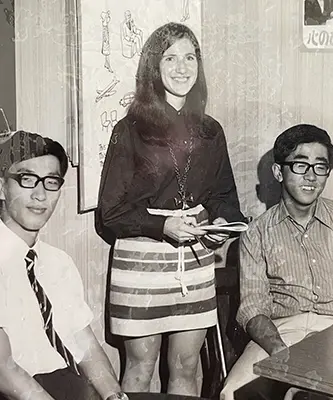

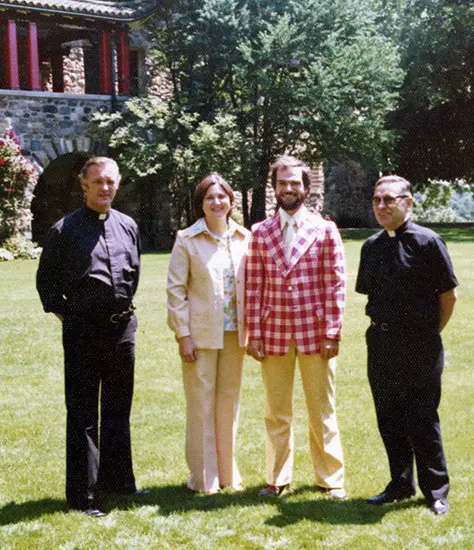
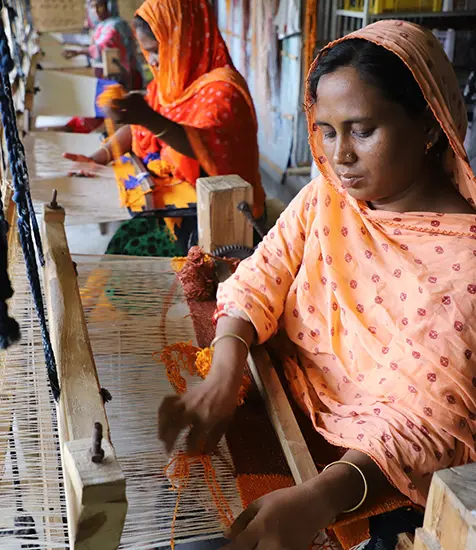
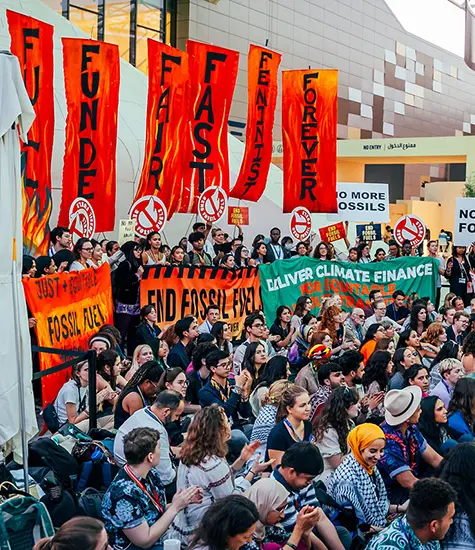




Thanks for sharing this, Mary. Such an interesting story – engagingly told.
Thanks Deirdre.
Thanks for this fun and interesting bit of personal and Maryknoll history.
thanks Cris.
I came across this article by accident, Mary. I thought those frozen red bean bars were fudgesickles too! You forgot to mention the ohagi (mochi rice covered with red bean paste) that we thought were chocolate eclairs.
Your perfectionist linguist friend Angi
Mary – I am a former YBU teacher too
I have an interesting story to tell you about meeting the South African President, DeKlerk- I also attended Barat College in Lake Forest IL-
Would love to have a conversation with you.
Please contact me-
Angi
without your impeccable language skills, none of us would have survived?!?!
Scooter sensei,
I happened to find you while I was doing some research on Maryknoll missions.
How exciting it was to come across my former YBU English teacher!
My name is Midori Kusunose. I hope you remember me.
When I studied in Michigan, I visited with you in Boston and you took me to Maine. I think we met some boys there.
I have long taught at Notre Dame College in Kyoto. I have also been a translator at the convent of School sisters of Notre Dame. I am an SSND associate and sometimes go to St. Louis for a conference.
And Angi…I remember her well. Didn’t my mother make a dress for each of you?
It’s been a long, long time. Now I am a grandma of four kids. Still in Kyoto with my husband.
I would like to talk to you more. I’m so happy I found you.
Midori
Midori
I remember you well. And I also remember the beautiful dress your mother made for me.
I have attempted to contact you through the years.
I would love to be in touch with you through email or what’s app or facebook.
Thanks so much for writing.
Mary Heidkamp
And Midori
Of course that is you in one of the photos!
Mary
I am surprised to come across this Maryknoll web site and learn of others in the YBU program in Kyoto, Japan. My mother and I travelled around the world in 1960, Japan being our second stop on the tour. We visited Kyoto and immediately fell in love with the deep culture. I started learning Japanese using the romaji method and we met Fr. James Hyatt and Fr. James Habenicht during this period. Fr. Hyatt challenged my mom and me, “If you have nothing better to do than travel around the world, consider staying in Kyoto for six months, and teaching English in the YBU program.” Mom agreed, and we were given housing arrangements in a home owned by the church, and shared with other staff workers. It was an amazing experience, resulting in my Aodani Catholic Church marriage to a young Japanese Kyoto University engineering student. Long story short, we raised five children, well immersed in both Japanese and American cultures. I was privileged to experience Japan, Fr. Hyatt, the YBU, and of course the Kyoto culture that changed my life and thinking forever.
Roberta Caswell Ohno
Seattle, WA